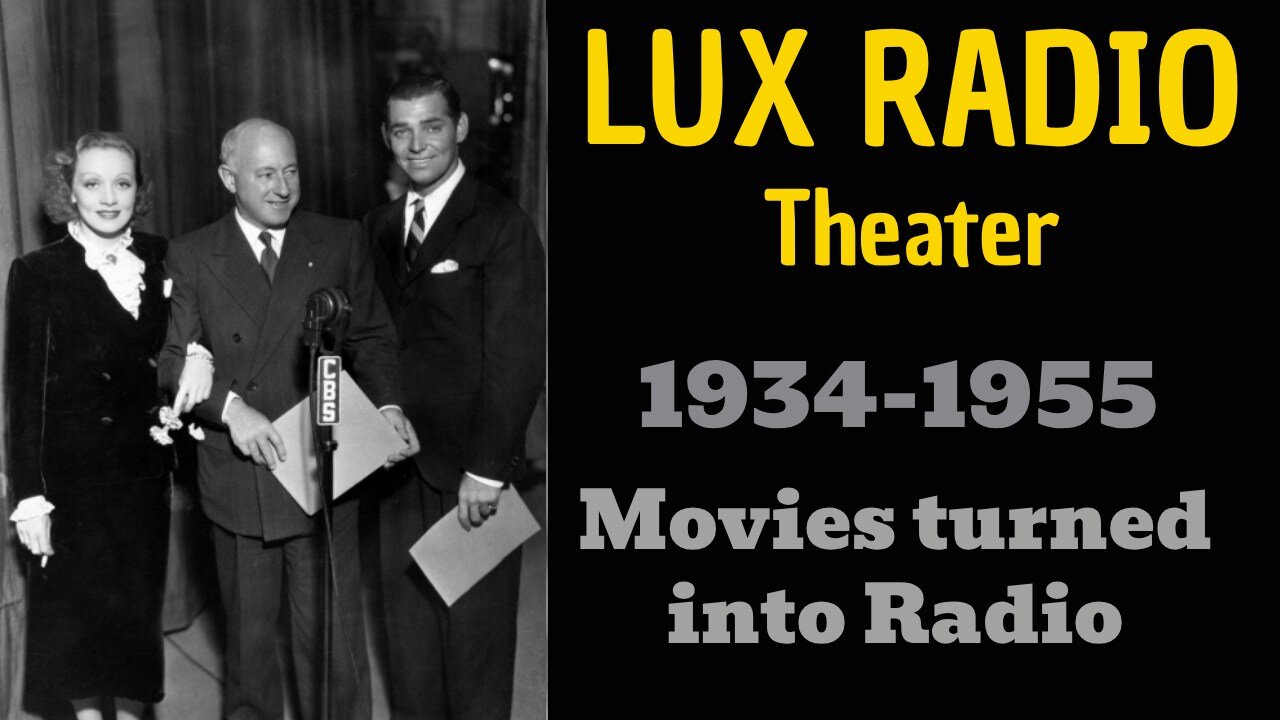Premium Only Content

Lux Radio 42-10-26 (ep367) Wake Island (Brian Donlevy, Robert Preston)
American action-drama war show
The film tells the story of the United States military garrison on Wake Island and the onslaught by the Japanese following the attack on Pearl Harbor.
Wake Island was nominated for four Academy Awards, including Outstanding Motion Picture.
The film shows how the Marines, after being pounded for days by Japanese aircraft, caught the Japanese invasion by complete surprise by unleashing a wall of fire that stopped the first attempt by the Japanese to land on the island. The next attack was successful in part because communications between the Marines had been cut, leading the Marine commander to believe his three hundred marines were being slaughtered by the over three thousand Japanese invaders. As a result of the fierce defense of the island and that a Japanese cruiser was sunk, Marines were beheaded on the way to Japan to work as slaves in the mines in Japan.
Lux Radio Theatre was indisputably the biggest, most important, most expensive drama anthology program on radio. It ran from October 14, 1934 until June 7, 1955, then continued on television as Lux Video Theatre until 1957. In all, some 926 episodes were broadcast, providing a record of the most important entertainment events in American theatre and, later, film.
The show was first broadcast on the NBC Blue Network on Sundays at 2:30 PM. The show featured adaptations of successful Broadway plays when it was produced out of New York, such as Seventh Heaven, the first production starring Miriam Hopkins, Smilin' Through, Berkeley Square, Daddy Long Legs, Peg O' My Heart and Way Down East. On July 29, 1935, the show moved to Monday night at 9:00 PM on CBS, where it would stay until June 29, 1954. The show moved to Hollywood on May 25, 1936 with the production of The Legionnaire and the Lady, based on the film Morocco, starring Marlene Dietrich and Clark Gable. The audience for this production was estimated as high as 40 million. The show featured many of the most important films of the period, adapted to fit the 60 minute time slot. Some of the titles for 1939 should indicate the caliber and range of shows: Stage Door, Ceiling Zero, So Big, It Happened One Night, The Lives of a Bengal Lancer, Lady for a Day, The Life of Emile Zola, Tovarich, Only Angels Have Wings, The Prisoner of Zenda, The Awful Truth, Wuthering Heights, You Can't Take It With You, The Old Maid and Goodbye, Mr Chips. For its last season, (1954-1955), the show moved to Tuesday nights at 9 on NBC.
Lux Radio Theatre was always broadcast live, with a studio audience and a full orchestra accompanying the performance and providing musical transitions between scenes. As many film actors were used to numerous takes and not live performance, they sometimes suffered acute stage fright before the show. However, since most received $5,000 for their performance -- in addition to free publicity for upcoming pictures -- actors appeared in their original screen roles if they were available. Indeed, production would halt if necessary, on a film if performers were called to appear on Lux. When the actors were not available, others stepped in. The plays were assembled and rehearsed for a week, in sharp contrast to many other shows, which required a minimal of an actor's time. Regular players for the series included Jim and Marian Jordan, otherwise known as Fibber McGee and Molly. Hosts included Cecil B. DeMille (1936-1945), William Keighley (1945-1952) and Irving Cummings (1952-1955). Directors included Tony Stanford, Frank Woodruff, Fred MacKaye and Earl Ebi.
-
 12:00:03
12:00:03
Delnorin Games
13 hours ago🔴 Live - Star Citizen
68.7K13 -
 1:39:44
1:39:44
HELMET FIRE
14 hours agoDEADROP IS BACK!
151K10 -
 10:03
10:03
Tundra Tactical
16 hours ago $15.40 earnedBrandon Herrera Vies Bid for ATF Director!
97.2K17 -
 22:01
22:01
DeVory Darkins
1 day ago $37.55 earnedHakeem Jeffries SHUTS DOWN The View as Matt Gaetz Speaks out
85.6K140 -
 2:02:54
2:02:54
Mally_Mouse
15 hours agoLet's Play!! - Spicy Saturday
64.3K2 -
 1:33:06
1:33:06
Slightly Offensive
16 hours ago $31.89 earnedAre You Ready for What's Coming Next? | Just Chatting Chill Stream
80.6K42 -
 32:10
32:10
MYLUNCHBREAK CHANNEL PAGE
1 day agoThe Gate of All Nations
151K67 -
 13:07
13:07
Sideserf Cake Studio
20 hours ago $3.92 earnedIS THIS THE MOST REALISTIC SUSHI CAKE EVER MADE?
66.6K4 -
 21:08
21:08
Clownfish TV
1 day agoElon Musk Tells WotC to BURN IN HELL for Erasing Gary Gygax from DnD!
53.9K16 -
 48:22
48:22
PMG
16 hours ago $11.91 earned"IRS Whistleblowers Speak Out on Biden Family with Mel K In-Studio"
42.6K25